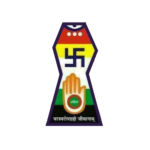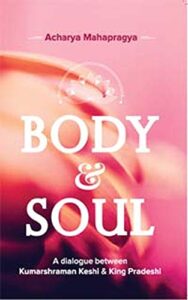
Body & Soul

About the Author
Being a poet along with being a philosopher is a rare combination. Acharyashri Mahapragya is a great poet besides being a great philosopher. The literature written by Acharyashri Mahapragya is proving very effective like panacea in solving the horrible problems of the present age like tension, lack of sensitivity, excitement, depression, terrorism, inferiority complex, hatred, fraud, immorality, lack of authenticity and absence of peace. In the books of Acharya Mahapragya, solutions of various problems have been given by way of experiments and training. His writings bring about an all-round development in one’s life and thus are rendering a great service to the humanity. Mankind will forever be obliged to him for his contribution that he has made through his literature.
About the Book
“Body and Soul” as authored by Acharya Mahapragya is a retelling of the dialogue between Kumarshraman Keshi and King Pardeshi, as recorded in the canonical text “Rayapaseniya”. An in brief outlook on the book is that the book is based on dialogue between a theist and an atheist, one is a believe of the soul and the other is a non-believer of the soul. Interesting is the fact that neither of the two try and force their respective belief on their counter-part. They actually indulge in a truthful, heartfelt, respectful and a non-biased conversation during which both share their respective views whole-heartedly.
If one wishes to know what questions shall they find answer to in this book, for them the answer is a one-liner,
The book revolves around the transition journey of an atheist to a theist, with complete analysis of the related topics and subjects and of course how can I miss the tiny limericks which the writer, Acharya Mahapragya has added here and there, which makes the reader co-relate the topics to their day-to-day happenings.
In my personal view, the book actually reminded me of another classic, the Vikram-Vetal stories which I believe we grew up listening to. In a way the dialogue between King Pardeshi and Kumarshraman Keshi is pretty similar to the dialogue between Arjuna and Krishna, on the battlefield of Kurukshetra. The only difference is that where Arjuna is actually clueless about his perceptions and ideas, and seeks the answers of Lord Krishna to get a clearer vision of a hazy view of Dharma, on the other hand King Pardeshi is seeking to change the perspective of Kumarshraman Keshi through his questions. However it is the simple yet logical answers of Kumarshraman Keshi which made his change his outlook on the subject of Soul and made him a theist. Yet, there is one thing which is common in both scenarios, which is an honest seeking of the Truth, let it be by Arjuna through Lord Krishna or by King Pardeshi through Kumarshraman Keshi.
The Story
The book opens with an innocent and an honest courtesan named Chitta who was loyal to King Pardeshi, was concerned about the dealings of his beloved King Pardeshi. He was completely honest about his work and about his devotion towards King Pardeshi. Still, there was a part of him which was always in realisation of the bad deeds of King Pardeshi and he always wanted the King to mend his ways one day and start the life of peace and non-violence. King Pardeshi was famous for his cruelty and bloodshed and Chitta was on a lookout of a way to make the King shed his practices. That is when he met Kumarshraman Keshi and convinced him to visit his kingdom one day and teach King Pardeshi the path of non-violence.
In a way, Chitta reminded me of Karna of Mahabharata, who was similarly devoted to Duryodhana. However a striking difference between the two was that Karna chose to ignore the wrong doings of Duryodhana and support him no matter what whereas Chitta was adamant on finding a way to mend his Kings cruel ways and start his journey on the path of peace and non-violence.
The story progresses as Chitta smartly brings King Pardeshi to the royal gardens where Kumarshraman Keshi was staying. King Pardeshi was surprised to see a monk in his kingdom, for he thought what would be the work of monk in a kingdom of atheist. That is when Chitta played his role and convinced King Pardeshi that if the King was able to convert a monk into an atheist then this would be remarkable. Hence, started the effort of King Pardeshi to try and convince Kumarshraman Keshi that the body and the soul are one and the same thing.
Now I won’t quote or discuss the entire set of details regarding the conversation between Kumarshraman Keshi and King Pardeshi. But I were to give an insight then it would be that King Pardeshi stated his experiments one by one which he committed in order to arrive at the conclusion that the soul is the body and there is nothing left after the body dies. His experiments were nothing less than a horror story and mirrored the cruel ways of King Pardeshi. But the sheer simplicity and calmness with which Kumarshraman Keshi heard each and every experiment and answered it with a very simple and logical example made me realize that however complex be the problem, a clear and clarified insight into oneself, helps one give or make out a very simple solution for the problem. The answers were so practical too and the ways in which Kumarshraman Keshi taught King Pardeshi of how crucial his role was of that of a King and how him being a role model for the entire kingdom, his deeds have to be exemplary. Such were the words of Kumarshraman Keshi that King Pardeshi was convinced by the end of the conversation that the soul is indeed different than the body and the soul survives the body after one dies.
What follows the change of King Pardeshi from an atheist to a theist is much more interesting. The reader then comes across a plot where the King’s wife tries to kill her own husband and how King Pardeshi reacts to the same is a meaningful insight into the mind of a theist. For me the entire storyline was so well crafted that anyone would find themselves so involved in the story that it becomes hard to keep the book down and for me it is the ending which surprised me the most. It would actually be my humble request to the readers of this article that the book is a must read irrespective of your belief and to just enjoy the sheer writing of Acharya Mahapragya Ji.
Quotes from the Book
- “Habits can and do change. Addiction to pleasure can result into harmful habits. But through determined and dedicated hard work and right practices, habits can be reversed, restricted or change.”
- “Every parent should question themselves as to where they are leading their children – towards pleasure only or also towards their well-being?”
- “The science of logic expounds that a person who talks of the impossible is not intelligent.”
- “The secrets of the micro world are such that they are hard to understand in the macro world.”
- “Often it is very difficult to correctly understand what is being said, and even more difficult to reach the truth of the matter. Every person’s understanding is not developed enough to interpret the true meaning of what is being said. One in whom this understanding is developed, does not have any question left unanswered, or any problem left unsolved.”
- “Change is necessary. Those who do not change with the times become stagnant and cannot achieve anything new.”
- “The auspicious activities of our mind, speech and body attract auspicious matter and inauspicious activities attract inauspicious matter. This holds the secret our happiness and unhappiness.”
- “When you are ready to kill someone with your sword, that is hell. And when you are at peace, it is heaven.”
- “Admitting to one’s limitations is also a very big thing. The ego, that ‘I can do everything’ is not good. One should always be aware of impossibilities.”
- “The soul of every living being irrespective of its size, be it an ant or an elephant, is made up of infinite undetachable and indivisible particles. There is no possibility of variance regarding this.”
- “One who sets out to seek, and diligently pursues his goal finds something special. This is possible when the seeker is flexible in his thought.”
- “Most conflicts in the world arise due to obstinacy.”
- “Once the light of true knowledge has been obtained then the journey into the darkness of ignorance ends.”
Contact Us
Feel free to post your queries, reviews and thoughts to us by writing to us at email@anadiananth.com or by filing out the form provided in the Contact Us page.
Phone No.: 8286000868
Address: 17/2 & 3, Parvati Niwas, Juhu Village, First Floor, Sector – 11, Vashi, Navi Mumbai – 400703 Above Global Pharmacy Shop Near Main Entrance Gate and Opp Shiv Sena Shaka Near Vinamra Swaraj Hospital
@Website Owned by Adv. Lalit K Jain
@ All intellectual Property Rights and Copyright of this Website is Owned by Adv. Lalit K Jain